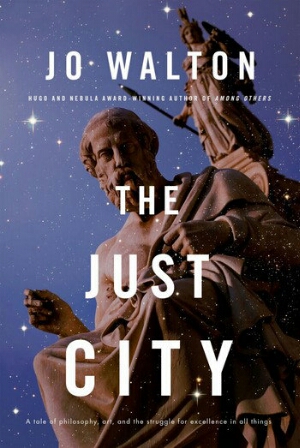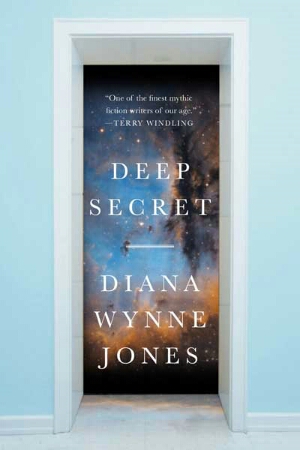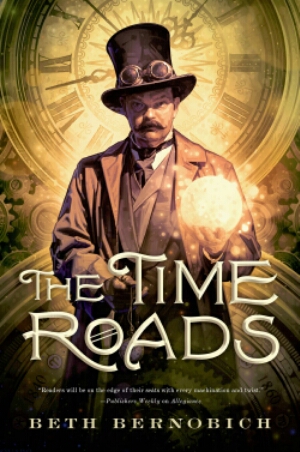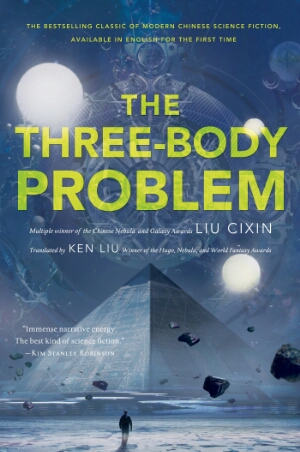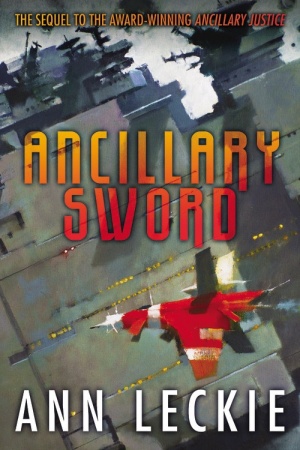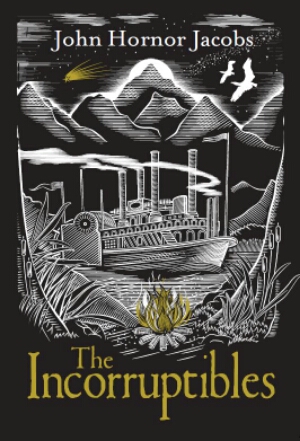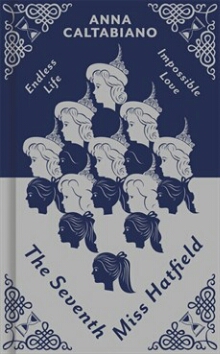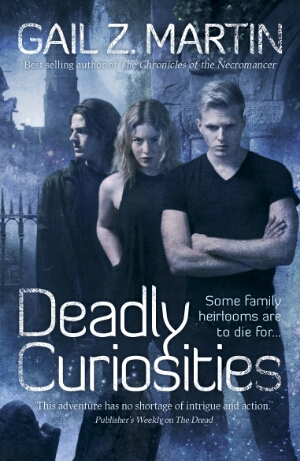Home » Posts tagged 'arc'
Tag Archives: arc
Necrotech by K. C. Alexander

Street thug Riko has some serious issues- memories wiped, reputation tanked, girlfriend turned into a tech-fueled zombie. And the only people who can help are the mercenaries who think she screwed them over. In an apathetic society devoid of ethics or regulation, where fusing tech and flesh can mean a killing edge or a killer conversion, a massive conspiracy is unfolding that will alter the course of the human condition forever.
With corporate meatheads on her ass and a necro-tech blight between her and salvation, Riko is going to have to fight meaner, work smarter, and push harder than she’s ever had to. And that’s just to make it through the day.
~~~~~
Sometimes, a reader is just in the mood for some fast-paced, face-punching fun; sometimes, all a reader wants is a thrilling ride through a novel which doesn’t require great intellectual or emotional engagement. A roller coaster, a thrill ride. That was my mood when I picked up Necrotech, at any rate.
Essentially, K. C. Alexander is playing in the 1980s cyberpunk swimming pool – the grimy chrome one, where corporations run everything, the world is fucked, and going merc is a pretty good option. Necrotech is a climate change driven disaster zone, although it feels like a 1980s climate crisis (not greenhouse gases but the ozone layer!), with Judge Dredd-like megacities full of crime and corruption; Alexander makes it incredibly clear this is a grimy, terrible place to live unless you’re corporate enough to be safely away from all the muck of the world she’s created. The biggest difference between most corporate dystopias and this one is how much glee Alexander seems to take in showing us the grimiest, most vice-ridden aspects of the world; throwing sex workers, in a vaguely whorephobic way, drugs, grunge and grime at the reader as if to drive home how debauched those outside-slash-below the law are.
That’s a trend that carries into the characterisation; Necrotech isn’t quite edgy-for-the-sake-of-edgy, but it pushes into that territory, especially in the vocabulary of the narrator. As someone not averse to swearing themselves, and who lives in Glasgow, I am used to the way swearing forms part of a vocabulary, but Riko seems to swear, occasionally in a repetitive manner, more than she breathes; she’s driven heavily by libido and anger, and singularly impulsive, and her character development is at times hampered by the way Alexander uses her sex drive almost as a replacement for character interaction. The rest of the cast aren’t, unfortunately, as interesting; they’re largely two dimensional or enigmatic to the point of being one-dimensional, and so don’t draw the sympathy they really need for the novel to have the emotional heft it might otherwise achieve.
Necrotech is also… sociopolitically interesting. Riko is bisexual and has a rapacious sex drive, to an almost comical level, while other characters are also sexual beings; the problem is that the book itself is quite heteronormative (gay marriage doesn’t appear to exist in this future, for instance) and the one queer relationship we see is a tragedy before the book even really gets going. The gender balance of the book is fantastic, and Alexander is absolutely unafraid of giving us badass combatative butch female characters, as well as very femme ones, sometimes the same people; and there’s a passing mention of nonbinary people as background, although no foregrounded characters are enby.
The plot is a mixed bag too. On the one hand, it doesn’t end. Necrotech falls into the trap so common to series of not really having a conclusion, just an ending, forcing the reader to go to the sequel; the problem is, I don’t know from this if Alexander can write an ending. On the other hand, while it lasts, it is pulse-poundingly action filled, with an approach to combat scenes which works brilliantly, putting one really into the fight the way the better class of video game does, making you feel not only the punches thrown but also the blows taken; Alexander is clearly aware of the toll fighting takes on one, and so makes it clear to the reader, too. The whole thing hangs together slimly – the plot is rather extended by the action scenes, but in a book like this, that works – as a kind of neo-noir mystery about what happened to Riko immediately as the book starts; it’s kept almost frustratingly mysterious, and Necrotech doesn’t really earn the lack of answers it gives, but that suggests that’s why we’re here.
It’s really not. In the end, Necrotech isn’t a sophisticated look at a dystopian corporate future interested in the complexities of life in a post-government climate-change-ridden world. It’s a throwback to 1980s cyberpunk, grimy, messy, action-packed, and problematic as hell, but fun with it.
DISCLOSURE: This review is based on a copy of the final novel provided by the publisher, Angry Robot Books.
If you found this review useful, please support my ability to write these reviews by contributing to my Patreon.
The Just City by Jo Walton
One day, in a moment of philosophical puckishness, the time-travelling goddess Pallas Athene decides to put Plato to the test and create the Just City. She locates the City on a Mediterranean island and populates it with over ten thousand children and a few hundred adult from all eras of history . . . along with some handy robots from the far human future.
Meanwhile, Apollo – stunned by the realization that there are things that human beings understand better than he does – has decided to become a mortal child, head to Athene’s City and see what all the fuss is about.
Then Socrates arrives, and starts asking troublesome questions.
What happens next is a tale only the brilliant Jo Walton could tell.
This review will contain SPOILERS
~~~~~
I am a Classicist (well, ancient historian) by academic training, so when Tor said they were bringing out a book based on the idea of Plato’s Republic (perhaps his most famos dialogue) and featuring among other characters Sokrates, Athene and Apollo, I jumped at the chance to review Jo Walton’s The Just City.
That may have been a mistake; that training is the only prism through which it was possible for me to read the novel, and that resulted in a certain level of cognitive dissonance at times.
The Just City is a novel about consent, about – as it puts it – equal significance and volition; choice, and the importance of equal weight being placed on the choices of all parties. It opens with Apollo asking Athene why Daphne would prefer to become a tree to having sex with him; when her response is “volition and equal significance”, he decides to incarnate to learn about these things – and is sold to the Just City, founded by Athene with people taken from history who had prayed to Athene to live in Plato’s Republic. Of course, Plato’s blueprint being rather incomplete, there are areas around the edge where things have been changed, and it is founded on Santorini so that no evidence will be left of Athene’s experiment except stories of Atlantis.
So far, so good; the problem comes when actually looking at the Just City. Built and maintained by robots brought back from the future, it is full of such anachronisms to Plato – the Republic was written before, among other things, antibiotics and safe birth, yet Walton treats both of these as a given, and no woman appears, in the three clusters of births in the novel, to die in childbirth, despite the reality of the ancient world; similarly, Santorini is presented as a haven where all resources are present, from marble (without any apparent quarries) to cotton and wool, despite the reality of the uneven resource distribution across the Mediterranean and, indeed, the lack of certain resources completely. The Just City could be forgiven those problems, perhaps, if it even acknowledged them and simply allowed Athene to smooth them out; as it is, instead, Walton simply pretends these issues do not exist and are not a problem.
A further, and significant, issue is anachronism of attitudes. It is perhaps inevitable in a novel like this that some characters will have anachronistic beliefs and attitudes but at the same time, the extent to which Walton engages in such practices is extreme. The Sokrates of The Just City is perfectly willing to debate with, and consider as intellectual equals, women, and believes in the standard understanding of the Greek gods; given the attitudes of his time and culture towards women – which we have no evidence he did not share – and the very reason he was sentenced to death, this seems to be a significant break with any meaningful sense of history. Meanwhile, later Romans – including, in fact, Cicero himself – are presented as having absolutely no time for the opinions of women; as if Athens in the fifth century had more respect for women and their views than Rome in the first century. The Just City takes this to further levels of anachronistic attitudes in its discussion about slavery; while obviously a novel about consent, it still seems inappropriate and unseemly to suggest that slavery in Athens was less common a status than that of freedmen, and that it was really rather liberal (p240). The way The Just City constantly backs away from the brutal reality of ancient slavery is rather horrifying, and while it is good to note that Walton does not do so with American slavery, erasing the awful history of slavery in the slave societies of the Classical world is rather more than distasteful, it is horrendous.
Walton also appears to have failed to have done some basic anthropological research; in response to Plato’s model of marriage and childbirth, she treats random assignation as abhorrent and doomed to fail, and the idea of raising children in common as incredibly hurtful to women. The Just City treats it as if there is some mystical bond that has been true in all societies and cultures across history between mother and child that requires personal raising; this is troubling given historical communities that have engaged in perfectly healthy common-rearing policies and societies where the mother had no engagement with their children until their later years, and Walton is erasing that reality completely.
Finally, Walton’s portrayal of Sokrates is almost Platonic in its hero-worship of him. Sokrates is portrayed as incredibly wise, knowledgeable on every subject, able to pick up anything – including Arabic numerals (called zeroic numerals here, for some reason) and the idea of artificial intelligence – in mere moments, and always able to talk to anyone and convince anyone to let him do what he wishes. While some of that makes sense in the context of a society of Platonists, The Just City treats Plato’s portrayal of Socrates as an incredible human being as unquestionable truth, made most clear at the close of the novel where Sokrates debates Athene on the Just City and the idea of justice itself; Sokrates, as in Plato, lays rhetorical traps, but for the reader they are obvious and poor, and that Walton’s Athene cannot engage with him seems to be suggesting that Sokrates is a better debater than the goddess of wisdom herself, a rather ridiculous assertion.
I have mostly argued with this book, and that’s for good reason; it’s a book begging to be argued with – but on the evidence provided in The Just City, Jo Walton has no time for anyone who argues with her views in it, and that’s a real problem. This is an interesting book, but it’s seriously let down by Walton’s inability to hold to the problems of history and reality.
DoI: Review based on an ARC received on request from the publisher, Tor Books. The Just City is released in the US & UK on January 13th.
Deep Secret by Diana Wynne Jones
All over the multiverse the Magids, powerful magicians, are at work to maintain the balance between positive and negative magic, for the good of all.
Rupert Venables is the junior Magid assigned to Earth and to the troublesome planets of the Koyrfonic Empire. When the Emperor dies without a known heir, Rupert is called into service to help prevent the descent of the Empire into chaos. At the same time, the senior Magid on Earth dies, making Rupert a new senior desperately in need of a junior. Rupert thinks his problems are partially solved when he discovers he can meet all five of the potential Magids on Earth by attending one SF convention in England. However, the convention hotel sits on a node, a nexus of the universes. Rupert soon finds that other forces, some of them completely out of control, are there too….
~~~~~
Deep Secret is, perhaps, a book that this is not the most auspicious time to rerelease; in the midst of serial dramas in fandom, a novel that is very much about fandom is a risky choice. On the other hand in the wake of the first UK WorldCon in nearly a decade, a novel that has an awful lot of its action take place at a UK convention (modelled closely on EasterCon) is perhaps not all that bad a choice after all…
Jones’ novel is nearly two decades old now, written in the dying years of the Major government, when fanzines were still largely paper affairs and the modern idea of social media not even a glimmer in anyone’s eye. Deep Secret is, in some ways, dated by that; its description of convention running, and how that functions, is surprisingly accurate to Satellite4, though, right down to the rather confusing (although thankfully not ratty-looking) schedule. Indeed, the portrayal of gophers, of casual and well meaning chaos, of unexpected feuds appearing mid-con all seems to line up with my own limited convention experience. But this isn’t really the core of the novel; more an aside before we delve into Deep Secret‘s own secrets.
The plot of Deep Secret is a slightly messy one. Rupert is assigned to oversee the transition of power – and, theoretically, downfall – of an inter-universal empire where magic is accepted much more readily than on Earth, whilst also, on Earth itself, searching for the replacement for his now-deceased mentor. Inevitably, the two jobs have a lot more interaction and entanglement than expected, and complications ensue. Some of these complications and really well written and, indeed, are foreshadowed interestingly or make sense of earlier elements of the book in hindsight; the way Jones conveys the intention of the Magids to allow the empire to flounder, for instance, is there right from the start with Rupert. However, Deep Secret also uses fate as a deus ex machina an awful lot at the end of the novel; indeed, the resolution is almost literally a god from the machine, played in such a blunt way as to bring the reader – up to that point greatly enjoying the tension and invested in the way Jones builds it – to a screeching halt in the face of “Suddenly, resolution!”
On the other hand Deep Secret‘s romance plot works much better than the main plot, even while ticking off any number of the stereotypes of the romance, especially the one of disdain becoming attraction. Mind you, a romance plot of reliant on strong character-work, and it is here that Jones delivers in spades; Deep Secret has a wonderful, and incredibly human, cast. From the increasingly shaky arrogance and self-assurance of Rupert, and his relationship with the ghostly and down-to-Earth Stan, to the student Malee Mallory with her heartbreak and stereotypical teenage self-absorption (a little odd in a 20-year-old, granted), each member of the core cast has a unique voice and brings something different and individual to the ensemble; and the supporting cast do the same, with their different relationships to the various protagonists and their simpler but still unique styles.
Deep Secret is a fantastic novel of character, and a wonderful portrayal and send up of fandom; it is simply a shame that Jones’ plot relies so heavily on deus ex machina to solve its problems at the close of the novel.
DoI: Review based on an ARC requested from the publisher, Tor Books. The new, paperback edition of Deep Secret will be released 16th December.
The Three-Body Problem by Liu Cixin (trans Ken Liu)
Three-Body Problem is the first chance for English-speaking readers to experience this multiple award winning phenomenon from China’s most beloved science fiction author, Liu Cixin.
Set against the backdrop of China’s Cultural Revolution, a secret military project sends signals into space to establish contact with aliens. An alien civilization on the brink of destruction captures the signal and plans to invade Earth. Meanwhile, on Earth, different camps start forming, planning to either welcome the superior beings and help them take over a world seen as corrupt, or to fight against the invasion. The result is a science fiction masterpiece of enormous scope and vision.
~~~~~
Liu Cixin is a phenomenon in China, but somehow, hasn’t reached the Anglosphere in translation… until now. The Three-Body Problem is Tor’s attempt to change this, with the aid of the award-winning short story writer Ken Liu in the role of translator. When a multiawardwinning author’s work is transmitted through the efforts of another, what kind of novel results?
Well, the first thing to comment on, perhaps, is the translation. Inevitably, The Three-Body Problem loses a little in translation, as all works taken from their original language do; but in this case it feels almost intentional, in a very interesting way – like Ken Liu is leaving Liu Cixin’s work as much as it was in Chinese as possible, rather than replacing idioms with English ones, reworking puns to work in English, or changing cultural references. Indeed, Ken Liu provides 42 footnotes across the course of the novel to explain translation choices and cultural references rather than simplifying or eliding them, which really keeps clear that this is a translation, rather than the smoothness of some works which attempt to wholly convert their original text into English, culturally and idiomatically.
Liu Cixin’s novel is a fascinating one, culturally, though. While being centred on Chinese culture, Chinese characters, and Chinese history, there is also a very Western sensibility to it in one particular respect; The Three-Body Problem feels like something incredibly steeped in the science fiction of the so-called Golden Age. In terms of style, of characters, of plot, Golden Age SF sensibilities pervade the novel; indeed, one of the protagonists,Ye Wenjie, feels like Asimov’s Susan Calvin in her emotionless disconnection from the human race and her base rationality. Liu Cixin also shares the problem-centric narrative of an Asimovian story; Three-Body Problem is focused very heavily on the solution to a mathematical problem and on the proper response to extraterrestrial communication.
This should make the book feel dated but somehow, through more interesting characterisation than Asimov especially ever managed, Liu Cixin keeps Three-Body Problem feeling like modern-day Golden Age SF; Wang Miao especially is a rounded character, driven by the rational problem and the desire for a solution to it but also with human feelings – panic, amusement, fear, shock, and so on. He grounds the novel in a way Ye Wenjie never could; that is, he grounds the novel with a character with whom the reader can easily empathise, rather one who seems almost totally closed off from human connection. It’s an interesting contrast to see, especially as Liu Cixin then subverts that at the close of the novel by revealing another side of Ye Wenjie, a more sentimental side, that The Three-Body Problem has largely concealed. That isn’t to say charicature doesn’t enter into The Three-Body Problem; the rogue, disrespectful police officer appears to be a cultural universal, given the character of Da Shi, who would fit right in with the protagonists of Dirty Harry, Luther and Life On Mars.
As far as plot goes, this is perhaps the strongest and also the weakest area of The Three-Body Problem. In some ways, Wang Miao’s simultaneous investigation of the Frontiers of Science, implicated in a series of suicides by scientists, and his playing of the game Three Body, are rather obviously linked and formulaic, with elements of surprise managing to shift things up but being comparatively minor, and things that seem to be intended to be reveals or twists failing to surprise. The nonlinearity of the plot fails to actually keep surprises back, although it does avoid giving too much away, but still, it seems a rather straightforward novel. On the other hand, Liu Cixin’s playing with narrative, with chronology, with stories within stories and the importance of stories all make the plot more interesting, and his approach to linking the different subplots and elements in The Three-Body Problem works really very well.
The Three-Body Problem, then, feels like a combination of the best bits of the Golden Age combined with modern sensibilities; it’s a tremendous work on the part of Liu Cixin, and an amazing achievement of Ken Liu’s translation to have captured so well the *feel* of the novel (or at least, to have seemed to have done so!)
DoI: Review based on an ARC requested from the publisher, Tor Books. The Three-Body Problem is released in North America on November 11th.
Ancillary Sword by Ann Leckie
Breq is a soldier who used to be a warship. Once a weapon of conquest controlling thousands of minds, now she only has a single body and serves the emperor she swore to destroy.
Given a new ship and a troublesome crew, Breq is ordered to the only place in the galaxy she will agree to go: Athoek station, to protect the family of a lieutenant she once knew – a lieutenant she murdered in cold blood.
~~~~~
Ancillary Sword, as the cover says, is the sequel to the Nebula Award winning, BSFA Award winning, Clarke Award winning, Hugo Award winning Locus Award winning, Kitschie winnning debut novel (yes, really) Ancillary Justice. Leckie’s sophomore outing, therefore, has a lot to live up to.
And boy, does Leckie deliver. In serious, glorious style. I went into Ancillary Sword nervous; having championed Ancillary Justice, having represented Ann Leckie at one of the many awards ceremonies she has triumphed at, having been so blown away by the first book, my fear that the follow-up would fall short was less about it not being good, and more about it not reaching the heights of its predecessor. Reader, I am happy to reiterate: it doesn’t. The linguistic idea of using female pronouns and nouns for everyone – mother and daughter, never parent or father or son – is not a trick that gets less interesting as we see it more; Ancillary Sword is more concerned with civilians and with interpersonal relationships among a broader spectrum of individuals, and therefore it has a different impact. The primary force is that gender, and hence sexuality, are irrelevant; it doesn’t matter what gender two characters who feel attraction are, they just feel attraction. That’s a really powerful and important thing to see, and Ancillary Sword showcases it excellently.
Of course, Ancillary Sword is far more than just that one element. Leckie, in this novel, has Breq captaining a Ship, AI and all; that Ship, Mercy of Kalr, hasn’t got ancillaries, but its previous captain ordered the crew to behave as if they were ancillaries. Leckie paints beautifully the various results of this for Breq, herself an ex-ancillary, ex-Ship; not only the relationship between a Ship-in-human-body and a Ship-as-Ship, but also the strange combination of discomfort and reassurance Breq takes from her false ancillaries, and the damage the loss of the hive-self has done. Ancillary Sword is a beautiful first-person portrait of Breq’s recovery, but isn’t just concerned with her; Lieutenant Tisarwat, a character introduced in this novel, has a not wholly dissimilar experience, and seeing the different ways each incorporates and deals with that experience is fascinating.
This isn’t a book focused wholly on relationships, though. Ancillary Sword feels like a response to On Basilisk Station; in each case a new commander is sent to take control of the defences of a station and the planets surrounding it. While David Weber’s Honor Harrington is concerned only with the military and logistical sides of this, Leckie has Breq take a far wider view of “defence”: and that gives Leckie a chance to delve into some of the socal fabric underlying the Radch empire. Socio-economic injustices and the way conveniently-invisible-but-vital groups come in for a serious critique and the idea of how to deal with the fallout of that, in the long term, is discussed as a problem, rather than being solved. The long-term impact of serfdom or slavery is discussed directly and seems to be an entry into discussions of how to deal with the US’s problematic history of oppression in the South; Ancillary Sword doesn’t just not seek to give answers, it actively demands we don’t look for easy answers or to simple saviours. Leckie goes so far as to include a power-imbalance rape, although it is never called that; but it is made abundantly clear that consent is impossible between two people with a major power imbalance (p282). The extent to which this book takes on social issues and the construction of, and underpinning of, society, is really glorious.
So far I’ve not actually really talked about the plot of the novel, but I don’t think that’s really necessary. Suffice to say that where Ancillary Justice was a brilliant, crunchy science fiction yarn with some hints of Iain M. Banks, Ancillary Sword completely strikes its own path; Leckie, here, is like no other author, and amazing with it. I don’t expect lightning to strike twice, but Ancillary Sword deserves – no, demands! – the same level of recognition as that received by Ancillary Justice.
DoI: ARC received from Orbit, the publisher of Ancillary Justice & Ancillary Sword, on request. I accepted the BSFA Award for Best Novel, won by Ancillary Justice, on Ann Leckie’s behalf at EasterCon. Ancillary Sword will be released on October 7th.
Gleam by Tom Fletcher
The gargantuan Factory of Gleam is an ancient, hulking edifice of stone, metal and glass ruled over by chaste alchemists and astronomer priests.
As millennia have passed, the population has decreased, and now only the central district is fully inhabited and operational; the outskirts have been left for the wilderness to reclaim. This decaying, lawless zone is the Discard; the home of Wild Alan.
Clever, arrogant, and perpetually angry, Wild Alan is both loved and loathed by the Discard’s misfits. He’s convinced that the Gleam authorities were behind the disaster that killed his parents and his ambition is to prove it. But he’s about to uncover more than he bargained for.
~~~~~
Tom Fletcher’s first foray into fantasy, Gleam, is a departure from his previous works of horror fiction; and that heritage has obviously had some kind of impact on the novel, the start of a trilogy from Jo Fletcher Books.
This is a book with an intensely visual, somewhat cinematic approach to writing; the prologue sees a focussing in on the Black Pyramid at the centre of the Gleam, through a degree of detail and in a writing style reminiscent of Miéville in Perdido Street Station. This sets the tone for the rest of the book; Fletcher takes an approach to style that is reminiscent of Lovecraft’s overwritten, purple prose but under much better control and to far greater effect. Gleam is full of intensely visual, detailed, vivid description, throughout the novel; while having a number of concerns beyond the purely aesthetic, it’s clearly a very strong prominent element and essential for the feel created by the novel.
That feel is one of estrangement; Gleam really goes for the jugular with its fictionalisation of current events (whether intended or not, Fletcher’s novel is an attack on Western responses to terrorism and to exploitative global labour relations), but through the use of the mundane seen through a filter of the strange – caravans of riding-snails, mushroom-based commercial empires, the rituals of the Black Pyramid – he makes these things less obviously analogous. That extends into the world itself; Gleam is a novel that very much conforms to what is referred to as “grimdark”, in a number of ways, chiefly its willingness to show the awfulness of the underbelly of the world and its violence. However, it avoids the misogyny that is commonly the lot of grimdark fantasy; no rape, women who have agency, independence, and martial prowess, and more than one female character amongst the central cast of five, all features to appreciate. With the vividity of his aesthetics and his grimdark sensibilities, a lot of anger comes through Gleam, especially in some of his characters.
Those characters are an interesting cast. Gleam tends towards the postapocalyptic grimdark fantasy end of the spectrum; each and every character is out for their own ends, many of which are quite dark, such as Eyes’ desire for revenge against the Pyramidders who tortured him. The different characters are all wonderfully painted, from the fey and deadly Bloody Nora (a cartographer; the clan of the Mapmakers is a hilarious, darkly brilliant piece of writing) to the obsessive Wild Alan and including the shaman-like tattoo artist Spider and mercenary Churr. But the smaller parts, such as Alan’s wife and son, or Daunt the Mushroom Queen, are also written to be far more than simple characters; while falling back at times on stereotypes and the expected – conservative wife more worried about not upsetting the status quo than her husband; libertine drug dealer with a streak of dark sadism; corrupt cop – they remain interesting characters in their own right.
Gleam weaves them into a plot that should be, but isn’t, the standard fodder of epic fantasy; Alan needs to find a MacGuffin, and this involves peril. He collects a group of friends and allies around him for the task, undertakes a long trek overcoming numerous dangers and risking friends along the way, successfully collects his MacGuffin and returns. Fletcher subverts a number of expectations of that classic plot model, though; albeit that subversion is the kind of subversion “grimdark” delights in – inevitably, there is unhappy sex, the deaths of various party members, and a few betrayals. Gleam also functions as a typical bildungsroman, albeit for the middle-aged Alan rather than a young adult; the plot of the novel revolves around Alan maturing as a person, coming to terms with the world – something we’ve seen all too often in fantasy, and Fletcher brings little new to it.
Gleam, then, is a dark, aesthetically beautiful fantasy that, while not altogether original in its plot, Tom Fletcher can be proud of; a Weird, angry, grimdark bildungsroman. Thanks Tom!
DoI: Review based on ARC solicited from Jo Fletcher Books. Gleam is released today.
The Incorruptibles by John Hornor Jacobs
In the contested and unexplored territories at the edge of the Empire, a boat is making its laborious way upstream. Riding along the banks are the mercenaries hired to protect it – from raiders, bandits and, most of all, the stretchers, elf-like natives who kill any intruders into their territory. The mercenaries know this is dangerous, deadly work. But it is what they do.
In the boat the drunk governor of the territories and his sons and daughters make merry. They believe that their status makes them untouchable. They are wrong. And with them is a mysterious, beautiful young woman, who is the key to peace between warring nations and survival for the Empire. When a callow mercenary saves the life of the Governor on an ill-fated hunting party, the two groups are thrown together.
For Fisk and Shoe – two tough, honourable mercenaries surrounded by corruption, who know they can always and only rely on each other – their young companion appears to be playing with fire. The nobles have the power, and crossing them is always risky. And although love is a wonderful thing, sometimes the best decision is to walk away. Because no matter how untouchable or deadly you may be, the stretchers have other plans.
~~~~~
This is the first of Jacobs’ novels I have read, and I come away with very mixed feelings. On the one hand, there is a fantastic reception element. On the other hand… well. We’ll get to the other hand of The Incorruptibles shortly.
The setting is the strongest part of this novel by far. A thinly veiled alternate Earth with an alternate history, demon-based industrial-scale everyday magic, and fantasy races (the vaettir, elves-ish, and dvergar, dwarves), The Incorruptibles‘ cast is entirely Rumans; and if you think that might be a thinly veiled reference to Romans, you’re right. Tripartite names, distinctly Roman attitudes and customs (both the triclinium and the toga are mentioned), an Emperor-and-Senate combination… it’s fascinating to see what Jacobs does with the familiar to both situate the reader in and alienate the reader from the world.
On the other hand, the worldbuilding also contains one of the biggest problems of the novel. The vaettir are savages, inhuman, murderous, and eaters of human flesh. They’re also scalpers, resisting the humans encroaching on their territory, and clearly marked as a villainous and evil race. The Incorruptibles forgets that, in the 21st century, the Westerns-style attitude to the colonised has become unacceptable; and that making your evil race somewhat obviously a parallel to stereotypical depictions of Native American culture is rather seriously problematic. That the women are given a decent role in the novel is, at first glance, a good thing; yet once again Jacobs displays attitudes that are rather less than appropriate. His point of view narrator consistently deploys the male gaze (describing one character’s bodice as “displaying her feminine features to great effect” [88]), and while Livia is a character who is competent, able to handle a number of roles, and able to use a shotgun, she still seems to turn to her sex as the weapon of first choice, and to naivete as a default state; without mentioning that the rest of the women are impressively awfully portrayed.
The Incorruptibles is also interminable. A novel with a plot so formulaic, without an untelegraphed twist in sight, needs to have either good characters or a good writing style to replace that. Jacobs’ prose. however, is slow, plodding, and dull; it feels like the benefits of first person (immediacy, for instance) have replaced any need for actual skill, to the point where Jacobs forgets that in a retrospective, future events should colour the past, that emotions need to be demonstrated, not just told, and that a poor approach to prose will only lose the reader’s attention. Instead, we’re treated to prose that is at best workmanlike detailing a plot that is dull, acted out by characters who are… well.
The cast of The Incorruptibles doesn’t make up for its failings. Livia has been discussed above; Fisk is, despite having backstory and clear hints of attempts to make him more, just another Western stock figure, the gunman with a heart of gold; Shoe, our narrator, is along for the ride, never showing any evidence for why Fisk puts up with him, or his abilities, just telling us about them; the Cornelii have personalities flatter than the featureless plain the book is largely set in, and even more one-dimensional than the approach to the vaettir; and the rest of the cast are equally irredeemably dull.
The blurb and quotes on The Incorruptibles try to situate it as part of the grimdark movement. To be related to that movement, one must have certain characteristics; a so-called crapsack world? Yes. A “realistic” approach to the world? Well, not really; the simplistic approach to the vaettir alone prevents that, but so do the approaches to Fisk’s attempt-at-character-development and Livia’s feelings. A willingness to show the grime and blood of a violent life? Well, passages lasting multiple pages about torturing a woman, dwelt on in almost pornographic detail, aside, no. And those passages are indeed pornographic; even as Shoe is supposedly disgusted, he describes them in a manner closer to lust than hatred.
The Incorruptibles is grimdark in the same way Terry Brooks is epic fantasy: derivative, dull, poorly written, and aping much better books. John Hornor Jacobs might not be a racist, nor a misogynist, but from this book, one wouldn’t know it.
DoI: This review was based on an ARC solicited from the publisher, Gollancz. The Incorruptibles will be released on August 14th.
The Seventh Miss Hatfield by Anna Caltabiano
There’s always been something odd about Cynthia’s next door neighbour, Miss Hatfield. Something beyond the strangely familiar miniature photographs and ramshackle house. And when Miss Hatfield tricks Cynthia into drinking a drop of the Fountain of Youth, she finds herself immortal.
She is the new Miss Hatfield and the next in line to the curse and blessing that is her legacy.
But immortality has a price. Becoming the new Miss Hatfield means letting go of who she was.
Tasked by her predecessor with recovering a mysterious painting, Cynthia finds herself in turn of the century New York. But someone else has followed her…
~~~~~
It is rare to have a Letter To The Reader at the front of a novel from its editor. Of course, it’s also rare to read a 17-year-old’s second novel when it comes from a major house like Gollancz and follows only a self-published debut. But with The Seventh Miss Hatfield, Anna Caltabiano clearly marks why these things can sometimes happen…
The Seventh Miss Hatfield is a time travel romance, a new addition in an increasingly broad tradition. As a romance, one expects to see the characterisation and emotional depth having special and significant emphasis laid upon them; Caltabiano manages incredibly well to write an eternal, ageless – but also seventeen year old – girl, born at the end of the 1940s and trying to fit into the early years of the twentieth century. We see the inner life of Cynthia so incredibly powerfully and vividly, and from her first-person narration see her conflicts so well-drawn, that Caltabiano’s authorial chops are well proven. The cast Cynthia observes and describes to the reader are also all impressively rounded, interesting people, not just Henley Beaufort, her impossible love, but Rebecca Hatfield, Nellie the servant-girl, and more. They’re all of their time and the way Cynthia comments on the fin de siecle attitudes of those around her is truly wonderful.
The plot is more romance than anything else. The Seventh Miss Hatfield isn’t terribly interested in the implications of time-travel on a broader scale than the personal, nor in the art theft; rather, Caltabiano is very much focused on interior lives, relationships between characters, and growing up. This is, of course, no bad thing, but it is something to be aware of when going into the book; this beautifully written set of relationships is handled masterfully and sensitively, with development and two-way influence with the rest of the plots in the book that really make it meaningful. Indeed, the way the concerns of the plot and of the characters’ emotions interact is one of the glories of this book, as they act contrary to reality and their emotions for well-explained and good reasons. This isn’t a book of happily ever afters, it’s a book of gains and costs.
In the end, from any writer this would be a beautiful romance novel; but coming from the 17-year-old Anna Caltabiano, The Seventh Miss Hatfield is something of a revelation.
DoI: Review based on an ARC solicited from the publisher, Gollancz. The Seventh Miss Hatfield will be released on 31st July.
Deadly Curiosities by Gail Z. Martin
Welcome to Trifles and Folly, a store with a dark secret. Proprietor Cassidy Kincaid continues a family tradition begun in 1670 – acquiring and neutralizing dangerous supernatural items. It’s the perfect job for Cassidy, whose psychic gift lets her touch an object and know its history. Together with her business partner Sorren, a 500-year-old vapire and former jewel thief, Cassidy makes it her business to get infernal objects off the market.
When a trip to a haunted hotel unearths a statue steeped in malevolent power, and a string of murders draws a trail to the abandoned old Navy yard, Cassidy and Sorren discover a diabolical plot to unleash a supernatural onslaught on their city.
It’s time for Kincaide and her team to get rid of these Deadly Curiosities before the bodies start piling up.
~~~~~
The blurb for Deadly Curiosities captures the plot pretty well, despite its apparent Paranormal Romance intimations (there’s none of that here); unfortunately what it doesn’t tell the reader is how uneven this book is, or even that it’s set in Charlseton…
That uneveness isn’t in the characters, to give Martin her credit. Deadly Curiosities has an amazing and vibrant cast; from Cassidy herself and Sorren, the immortal whose history with the Kincaides and more broadly weighs on him as a long history of losses and of fighting the supernatural, through Teag and Anthony, Cassidy’s employee and his high-powered corporate lawyer partner, and in more minor characters, Martin ensures these are rounded believable figures. Actually, this romance is a beautifully written one; Anthony’s concern but willingness to help his partner, Teag’s concern for Anthony himself, and the simplicity of the presentation of them as a gay couple (and indeed the only couple in the novel) is really well done.
Maggie, who appears only briefly, is rendered vividly and powerfully both by her description in her appearance and by her absence; Drea is a friendly gossip whose garrolousness is brilliantly shown; Mrs. Morrissey, the woman who curates the town archives and has a taste for the scandalous; and the rest of the cast. If one thing jars, it’s that Deadly Curiosities is packed with people who Martin keeps dropping hints are sensitive to magic, but never follows through on that; just one of many trails laid down by the book and never followed up on.
It’s here that the book begins to fall apart. While the core plot is an interesting one that would sustain a well-paced book of this length, Deadly Curiosities buries it under other things. The overuse of Cassidy’s abilities slows the pace and ties the story in knots, Martin both wanting to showcase it and also scrabbling to avoid it leading to the conclusion of the novel; and the role a series of dei ex machinae play in the story make it stumble and stutter rather. Similarly, Cassidy’s repeated “I’ll remember to do this later” are almost all followed by not doing them, while other things just seem to drift off into the aether, never actually paying off, especially a repeated use of foreshadowing lines that never pay off, taking away all the power of foreshadowing in the novel.
The writing drains power from more than just the overuse of non-foreshadowing; Deadly Curiosities has its moments, but on the whole is a messy, repetitious and confused novel to read. Facts come up and vanish before being repeated as if for the first time; the story keeps grinding to a halt for another strangely impersonal and unemotional vision from Cassidy; coincidence is relied on far too often. Even scenes that really shouldn’t cause the novel to slow make the reader pause, as Martin writes fight scenes that from a number of standpoints are inconsistent or nonsensical; indeed, this inability to write fights becomes more absurd as the novel continues with Martin dropping them in randomly and for no good effect.
Sadly, Deadly Curiosities had a great potential to be an excellent novel which in reality let itself down; Gail Z. Martin had a great kernel and buried it under dross.
DoI: Review based on a pre-publication ARC solicited from the publisher, Solaris. Deadly Curiosities is out third of July.


